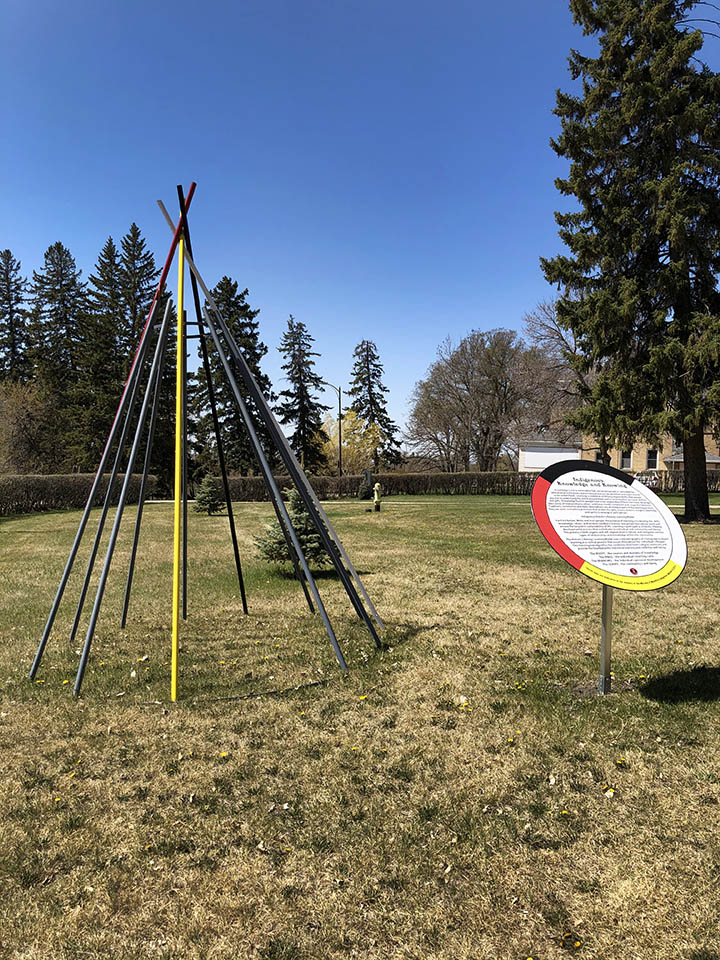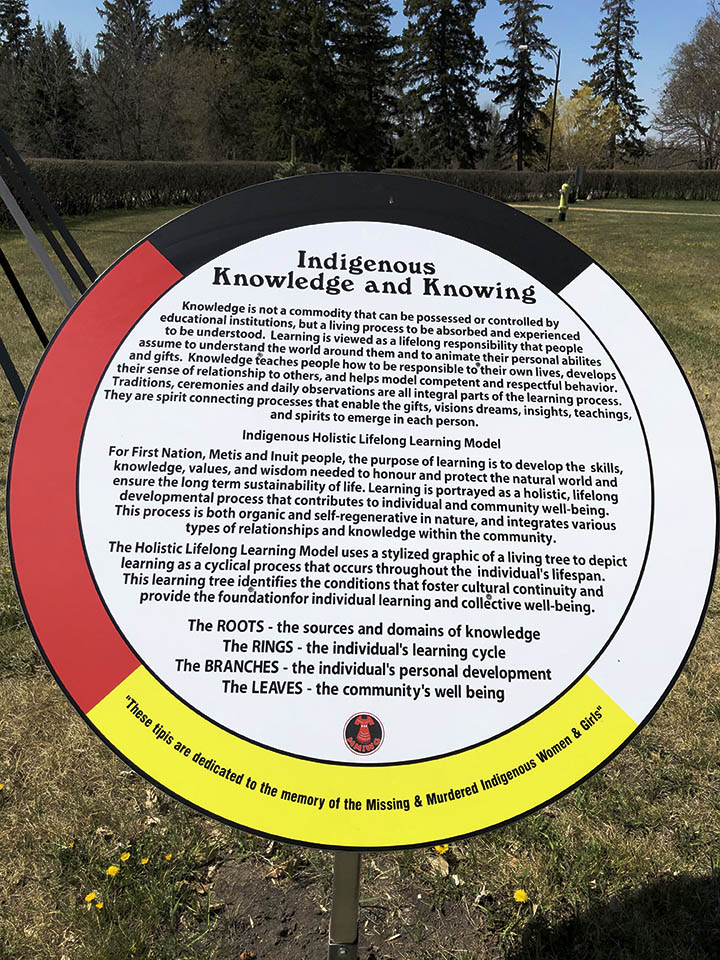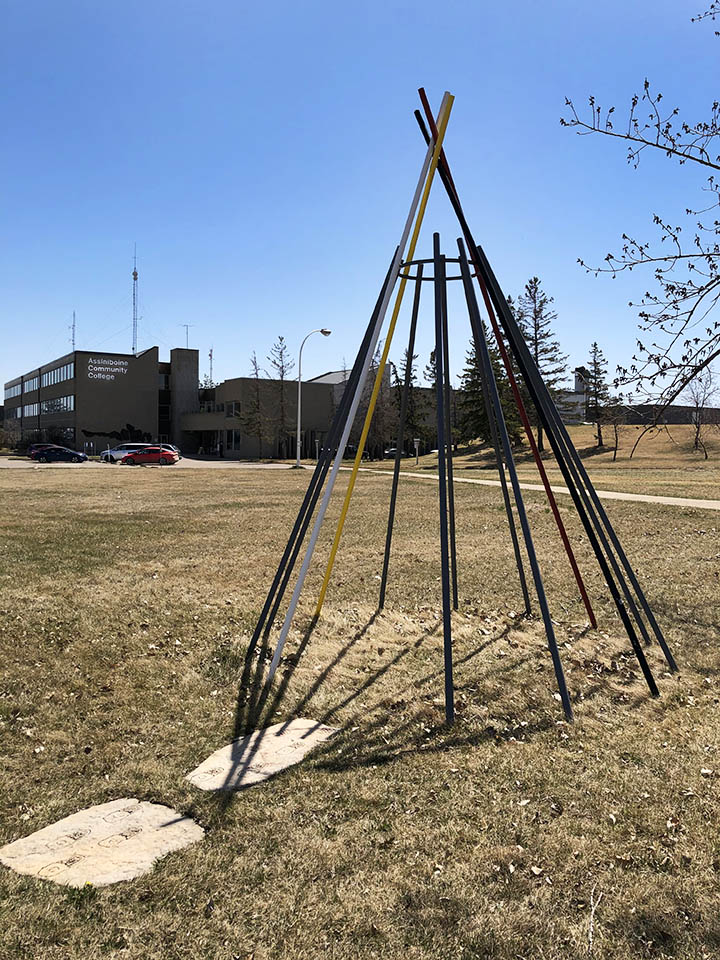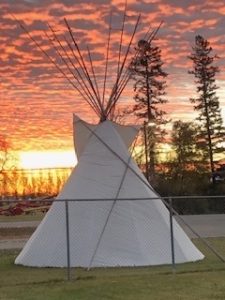About the Tipis at Assiniboine
Assiniboine has two commemorative tipis in Brandon installed at our North Hill and Victoria Avenue East campuses. The installations are part of the Tipi Tour legacy project, a community-wide initiative led by Brandon’s Walking With our Sisters committee. The tipis celebrate and honour our commitment to reconciliation. Each tipi offers different themes of reflection and understanding.
The North Hill Tipi
The North Hill tipi shares the Indigenous worldview of lifelong learning. The First Nations Holistic Lifelong Learning Model uses a stylized graphic of a living tree to depict learning as a cyclical process that occurs throughout the individual’s lifespan. This learning tree identifies the conditions that foster cultural continuity and provide the foundation for individual learning and collective well-being.


Text From the North Hill Tipi Plaque
Indigenous Knowledge and Knowing
Knowledge is not a commodity that can be possessed or controlled by educational institutions, but a living process to be absorbed and experienced to be understood. Learning is viewed as a lifelong responsibility that people assume to understand the world around them and to animate their personal abilities and gifts. Knowledge teaches people how to be responsible to their own lives, develops their sense of relationship to others, and helps model competent and respectful behaviour. Traditions, ceremonies, and daily observations are all integral parts of the learning process. They are spirit-connecting processes that enable the gifts, visions, dreams, insights, teachings, and spirits to emerge in each person.
First Nations Holistic Lifelong Learning Model
For First Nations peoples, the purpose of learning is to develop the skills, knowledge, values, and wisdom needed to honour and protect the natural world and ensure the long-term sustainability of life. Learning is a holistic, lifelong developmental process that contributes to individual and community well-being. This process is both organic and self-regenerative in nature, and integrates various types of relationships and knowledge within the community.
The First Nations Holistic Lifelong Learning Model uses a stylized graphic of a living tree to depict learning as a cyclical process that occurs throughout the individual’s lifespan. This learning tree identifies the conditions that foster cultural continuity and provide the foundation for individual learning and collective well-being.
The model contains four main components that depict the dynamics that enable First Nations to experience holistic lifelong learning as a purposeful developmental process. The components include:
- Roots: the sources and domains of knowledge;
- Rings: the individual’s learning cycle;
- Branches: the individual’s personal development;
- Leaves: the community’s well-being.
(Chiefs Assembly on Education, 2012)
The Victoria Avenue Tipi
The Victoria Avenue tipi shares Assiniboine’s land acknowledgement (outdoor plaque) and the commitments we agreed to as signatories of the Indigenous Protocol for College and Institutes (indoor plaque).

- Commit to making Indigenous education a priority.
- Ensure governance structures recognize and respect Indigenous peoples.
- Implement intellectual and cultural traditions of Indigenous peoples through curriculum and learning approaches relevant to learners and communities.
- Support students and employees to increase understanding and reciprocity among Indigenous and non-Indigenous people.
- Commit to increasing the number of Indigenous employees with ongoing appointments throughout the institution, including Indigenous senior administrators.
- Establish Indigenous-centred holistic services and learning environments for learner success.
- Build relationships and be accountable to Indigenous communities in support of self-determination through education, training, and applied research.
The Parkland Campus Tipi
Assiniboine Community College’s Parkland Campus in Dauphin has a tipi on-site, highlighting the institution’s commitment to Indigenous culture and community. The tipi serves as a cultural space for gatherings, ceremonies, and educational activities. It also supports the Indigenous Affairs and Elders & Knowledge Keeper programs at the college, offering students a chance to engage with traditional knowledge and practices. This tipi, along with other initiatives, underscores the college’s efforts to create inclusive spaces for Indigenous students and promote reconciliation


